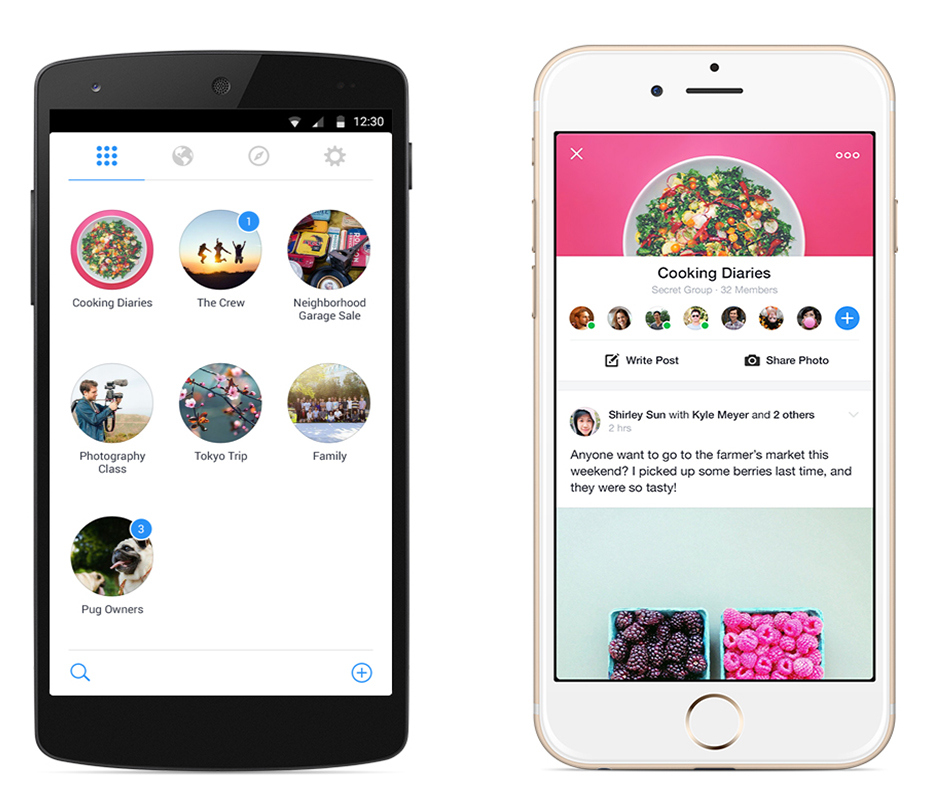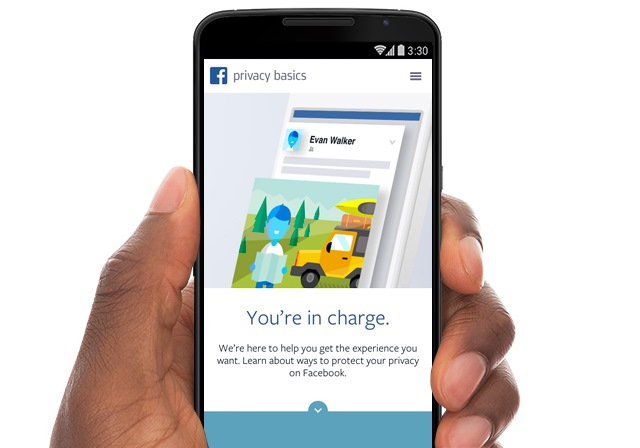
Facebook and YouTube responsible for over a third of mobile traffic
Ever wondered how much mobile traffic those two behemoths of the mobile (and indeed desktop) world, Facebook and YouTube actually use?
Well, as far as North American traffic goes -- as measured by a Sandvine report compiled by BI Intelligence for Business Insider -- in September, Facebook accounted for 19 percent of mobile traffic, and YouTube snagged almost as much at 18 percent.

Barack Obama -- becoming a computer scientist just takes 'a little math and science'
Today marks the start of the 2014 Computer Science Education Week. As part of this, the second annual Hour of Code is being used to introduce school children to the basics of programming. Students around the world are encouraged to take part in the event which is organized by non-profit Code.org.
The venture has the backing of Barack Obama who is keen to nurture the next generation of coders and computer scientists. And there's no reason to be put off. To quote the president, "becoming a computer scientist isn't as scary as it sounds. With hard work and a little math and science, anyone can do it".

Social networks reimagined as guys -- hipsters, businessmen and kooks
A little over a year ago, fashion photographer Viktorija Pashuta released images from a photo shoot entitled What If Girls Were Internet Browsers. It was a simple, fun idea in which Internet Explorer, Firefox, Opera, Chrome and Safari were given female personas and represented by models. Now Viktorija has a new project -- What if Guys Were Social Networks.
The idea's very similar to last year's project. Twitter, Instagram, Facebook, Google+, tumblr, Pinterest, flickr and LinkedIn are all anthropomorphized into eight men, each with their own unique look and personality. In the line-up of social networks, all of the major players are represented, but the new kid on the block, Ello, is notable by its absence.

Facebook joins forces with ESET to fight malware for free
As part of an on-going battle against malware and abuse of the social network, Facebook has joined up with security firm ESET. The partnership follows on from the news back in May that Facebook was working with both Trend Micro and F-Secure to try to combat the threat of malware. The addition of ESET makes a trio of security partners, and Facebook has incorporated the company's technology into its own security systems.
Facebook hopes that by combining the power of F-Secure, Trend Micro and ESET, it should be possible to block the appearance of more malicious links from newsfeeds. The thinking is that adding more security providers will helps to catch even more malware without the need to rely on users having antimalware software installed.

Facebook tells advertisers how to (very) closely target users this holiday season
Ads are hard to avoid at the best of times, but it has a tendency to get a little worse in the run-up to Christmas. Advertising has become increasingly prolific on social networks, and this is certainly true of Facebook. As we enter the holiday season, Facebook is providing advertisers with advice that will enable them to deliver finely-tuned ads at highly specific sets of users.
If you picked yourself up a new tablet in the Black Friday or Cyber Monday sales, Facebook makes it possible for advertisers to pick you out of the masses. The social network is not only rolling out a couple of new features to help with targeted advertising, but also providing tips for more successful campaigns.

Social networks do not represent the real world
Researchers have warned that big data trends discerned from social networks, like Twitter and Facebook, misrepresent the real world because they use biased information.
Computer scientists at McGill University, Montreal and Carnegie Mellon University in Pittsburgh, have discovered that social media is often guilty of "population bias", as large sections of society are not represented by the sites.

Social networks told to be honest and stop bamboozling their users
The UK parliament is calling on social networks such as Facebook and Twitter to simplify their terms and conditions. The Science and Technology Committee has expressed concern that privacy policies and other documents are strewn with legal terms that most people do not read or understand. This means that most social network users are simply not aware that they have agreed for their personal information to be used in various ways -- and are certainly unaware of how it might be used.
The Committee is calling for social networks to make a commitment to explain in very clear terms how personal data is shared and used. It wants to work with the government to draw up a set of standards -- almost a social networking manifesto -- that companies can sign up to.

Now Twitter is going to start monitoring which mobile apps you download
Hate 'em, loathe 'em or abhor 'em, it's hard to avoid ads. You know that you're a consumer. Companies exist because you consume, and you are encouraged to consume more and more. To help lead you to consume, you need to be subjected to advertising -- it's all part of the money-go-round of using the web.
Tailored ads are more likely to bring in cash, and social networks are in the business of gathering information about their users with a view to delivering the most laser-focused targeted advertising possible. The latest venture by Twitter involves keeping tabs on the apps you install on your iOS or Android phone or tablet.

Tech companies like Facebook and Google lead the way in delivering LGBT equality in the workplace
US technology companies are setting a benchmark for those in other sectors to reach for when it comes to LGBT equality in the workplace. These are the findings reported in the thirteenth edition of the Human Rights Campaign (HRC) Foundation’s Corporate Equality Index. The HRC rates workplaces on lesbian, gay, bisexual and transgender inclusion and equality, and this year's report shows that there is now greater awareness and understanding of the transgender community.
The index rates companies using a variety of factors including the presence of non-discriminatory policies, the existence of transgender-inclusion healthcare, and whether or not there are guidelines in place to encourage transgender inclusion. This year there are a record number of businesses attaining a 100 percent rating, and 14 of these fall into the hardware, software and data services areas of the tech sector.

Will LinkedIn make a move into the enterprise?
News surfaced this week that Facebook was considering a move into the enterprise sector with the imaginatively titled 'Facebook at Work'. Not a great deal is known about the service yet, but pretty much everyone is in agreement that it could provide interesting competition to incumbents like Microsoft and even the likes of LinkedIn.
It has long struck me as surprising that LinkedIn hasn’t made a similar move. Back in 2011 Jeff Weiner, CEO of the company, suggested that enterprise social tools was "an area where we want to add value". Yet so far we’ve seen nothing particularly interesting.

Facebook continues to show it 'gets' mobile with new Groups app
If you use Facebook on mobile, you will be familiar with Messenger, Facebook's separate app dedicated for messaging. While some people hated having to download another app, others enjoyed it -- including myself. Mobile is a world meant for apps that do one thing well. With a relatively small screen size, optimized apps have the best experience -- not ones that cram in all the functionality they can. Facebook is continuing to follow this philosophy with its new dedicated app for Facebook Groups.
The official Facebook app includes everything, however, the only thing it does well is allow you to browse your newsfeed. To view your Groups on the mobile app requires going into the 'more' tab and scrolling down to select a Group. With a new dedicated app, all you have to do is open the app and you have all your Groups laid out in a grid waiting for you. Also, I find using the Groups app a much more pleasant experience. There are nice animations, and easy access to notification and privacy settings, among various other small features.

Could Facebook at Work put the work back into social networking?
There are some people who just can’t get enough of Facebook. Sharing the occasional thought or ponderance is not enough for many who feel the need to live out their entire lives on Zuckerberg's social network. A lot of workplaces -- perhaps sensibly -- block access to sites such as Facebook, but new reports suggest that the social giant is keen to enter the office on legitimate terms with Facebook at Work.
At the moment, Facebook is the bane of network admins' lives as employees find new ways to bypass restrictions that may be put in place. But the Financial Times says that it may soon be welcomed with open arms as a work-centric version of Facebook is rumored to offer Office- and Google-baiting document collaboration, and LinkedIn-aping professional networking.

WhatsApp and Facebook lead the way with global app engagement
Facebook’s stable of apps lead the way in Western Europe and around the world when it comes to user engagement on social media and messaging apps.
Mobidia’s new "Social Media & Messaging Engagement: Chat, Social, Videoconferencing, Rich Media and VoIP Apps" white paper found that social and chat apps dominate the top end of the mobile app usage scale and Facebook is a huge part of why.

Facebook proposes privacy policy changes in simplified, prettified paperwork
Facebook gets something of a bad rap when it comes to its privacy policy. Delve into the social network's terms and you're almost certain to find something you disagree with. This is the same with many companies, particularly those with an online presence, but users seem to be continually surprised to discover how their data and activities are being used and tracked. Part of the problem is that -- just like with software EULAs -- very few users bother to read through policies in full.
Mark Zuckerberg's social network is looking to change that. Facebook is introducing Privacy Basics which provides easy-to-follow guides to controlling how your online content is shared with others. But there are also a number of changes proposed to its privacy policy. Facebook is looking for feedback, and assures users that "you’re in charge." But you'll need to be quick -- there's only a week to give your opinion.

Most parents believe Facebook is a bad influence on their kids
A new piece of research has emerged showing how parents feel about the potential positives and negatives of their offspring’s use of technology -- and social networks didn’t come off well.
The Parenting in the Digital Age report was carried out by Hart Research Associates for the Family Online Safety Institute (FOSI), and found that on an overall level slightly more parents (53 percent) felt that the benefits of tech outweigh any drawbacks. The boon foremost in parents’ minds was the potential for education and learning online and with technological devices.
